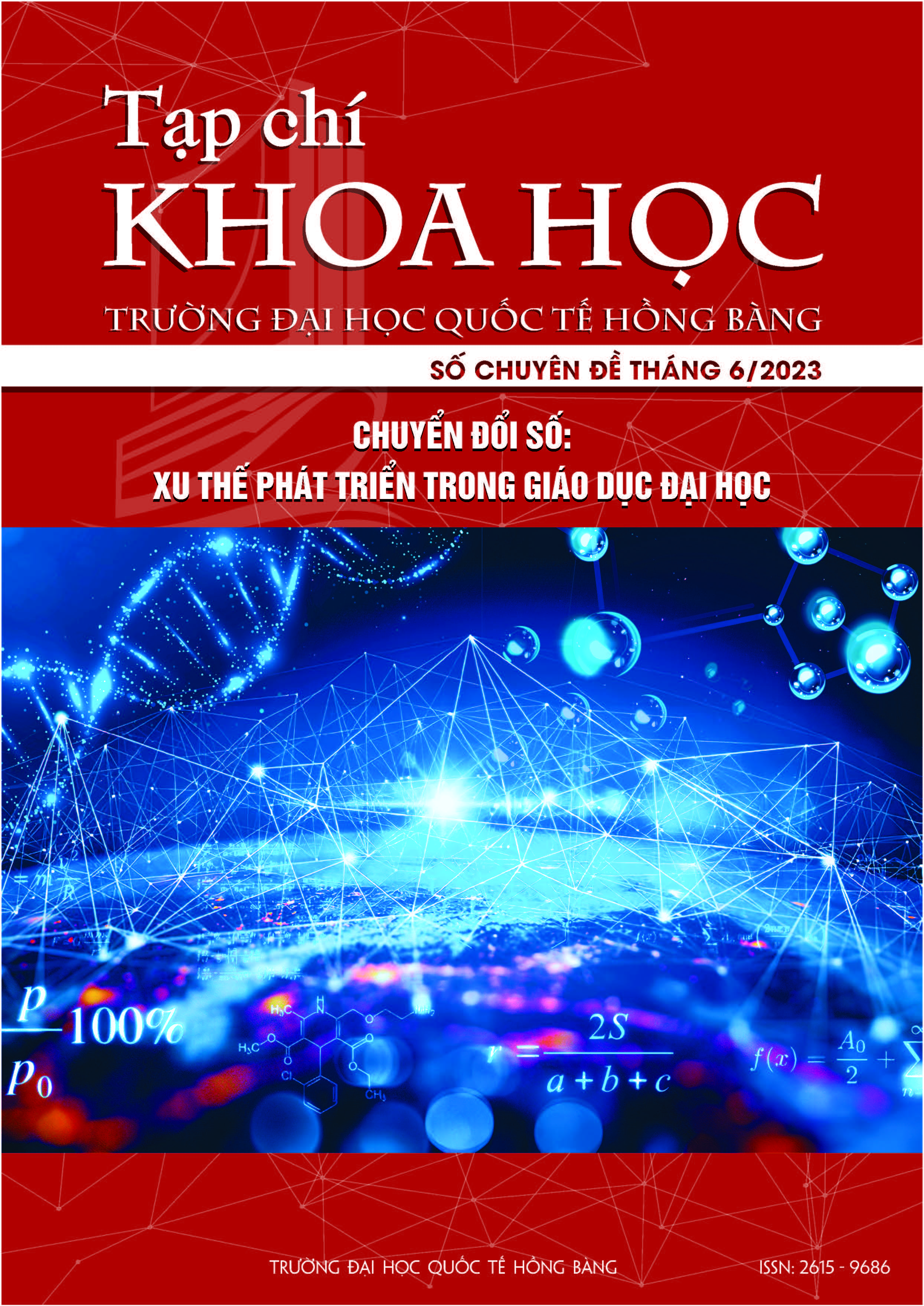Chuyển đổi số trong giáo dục đại học: Bài học từ kinh nghiệm quốc tế
Các tác giả
DOI: https://doi.org/10.59294/HIUJS.CDS.2023.368Từ khóa:
số hóa, công nghệ kỹ thuật số, chuyển đổi số, chuyển đổi số trong giáo dụcTóm tắt
Từ đại dịch Covid – 19, thuật ngữ “Chuyển đổi số trong giáo dục” được sử dụng nhiều hơn trên thế giới, trong đó có Việt Nam, khi hơn một tỷ học sinh, sinh viên buộc phải học tập tại nhà. Chuyển đổi số (CĐS) trở thành vấn đề và nhiệm vụ ưu tiên của các cơ sở giáo dục đại học trên thế giới từ những năm đầu của thế kỷ 21. Nếu một trường đại học muốn tồn tại theo thời gian trong quá trình CĐS này, các Trường phải phát triển số hóa và CĐS để khai thác hiệu quả nhiều cơ hội và tiềm năng được mở ra bởi vô số công nghệ kỹ thuật số sẵn có, xác định lại các mô hình hoạt động trên toàn bộ chuỗi giá trị do công nghệ mang lại [1]. Ngày nay, kỹ thuật số đã đi sâu rộng vào cuộc sống hiện đại, việc tích hợp sử dụng các công nghệ kỹ thuật số vào quá trình giáo dục càng trở nên cấp thiết. Do đó, đầu tư tài chính, xây dựng các nguồn tài nguyên số, thay đổi hình thức tổ chức giáo dục, đòi hỏi thích ứng về tâm lý con người, ... mang lại những lợi ích to lớn nhưng cũng dẫn tới nhiều khó khăn cần giải quyết. Mục tiêu tiếp cận và tổng hợp kinh nghiệm quá trình CĐS trong giáo dục đại học trên thế giới của bài viết này, do vậy là có ý nghĩa và cần thiết.
Abstract
Since the Covid – 19 pandemics, the term "Digital transformation in education" is used widely in the world, including Vietnam, when more than one billion students were forced to study and attend school from home. However, digital transformation has become an issue and priority task of higher education institutions in the world since the early years of the 21st century. If a university is to survive the passage of time in this digital transformation, they must develop and embrace digital transformation to effectively explore all the opportunities offered through a multitude of available digital technology, redefining operating models across the entire technology – driven value chain. Today, digital has penetrated deeply into modern life, integrating the use of digital technologies into the educational process becomes even more urgent. Therefore, financial investment, building digital resources, changing the form of educational institutions, requiring adaptation of human psychology, ... bring great benefits but also lead to many difficulties to handle. The objective of this research paper is to approach and synthesize experiences of digital transformation in higher education in the world. Therefore, it’s meaningful and necessary.
Tài liệu tham khảo
[1] B. Castro, L. M., et al., “Digital Transformation in Higher Education Institutions: A Systematic Literature Review”, Sensors, 20(11), 3291, 2020.
[2] B. Maltaverne, Digital transformation of Procurement: a good abuse of language? 2017. [Online]. Available at http://www.thedigitaltransformationpeople.com/channels/the-case-for-digital-transformation/digital-transformation-of-procurementa-good-abuse-of-language. [Accessed on May 3, 2023].
[3] T. Cochrane, V. Narayan, and J. Oldfield, IPadagogy: Appropriating the iPad within pedagogical contexts. International Journal of Mobile Learning and Organisation, 7, 48–65, 2013. DOI: https://doi.org/10.1504/IJMLO.2013.051573
[4] D. Marcum, The digital transformation of information, education, and scholarship. Int. J. Hum. Arts Comput, 8, 1–11, 2014. DOI: 10.3366/ijhac.2014.0095
[5] J. Hietala and C. Carmada, Digital Transformation of Learning, Valamis. 2015.
[6] J. Balkin & J. Sonnevend, The Digital Transformation of Education, Yale Law School, Public Law Research Paper No. 564, 2015.
[7] J. Sullanmaa, K. Pyhältö, J. Pietarinen and T. Soini, Curriculum coherence as perceived by district-level stakeholders in large-scale national curriculum reform in Finland, The Curriculum Journal, 30(3), 244-263, 2019. DOI: https://doi.org/10.1080/09585176.2019.1607512
[8] UNESCO, Positioning ICT in Education to Achieve the Education 2030 Agenda in Asia and the Pacific: Recommendations for a Regional Strategy. 2018.
[9] N. T. T. Vân, Chuyển đổi số trong các cơ sở giáo dục. Tạp chí Quản lý nhà nước, số 309 (10/2021).
[10] A. P. Johan and R. F. Handika, Digital Transformation: Insight from Leaders in the Mid-rank Universities in Indonesia, In Proceedings of the 2019 3rd International Conference on Education and E-Learning, pp. 52-55, 2019.
[11] Đ. T. N. Quyên, Chuyển đổi số trong giáo dục: Những thách thức và nguy cơ. Tạp chí Tia Sáng, 2021, Bộ Khoa học và Công nghệ.
[12] Ministry of Education and Higher Education - MoEHE, Education Sector Strategic Plan (2017–2022) in Palestine, 2017. [Online]. Available at https://planipolis.iiep.unesco. org/sites/default/files/ressources/palestine_education_sector_strategic_plan_2017-2022.pdf. [Accessed on May 3, 2023].
[13] B. Kang, How the COVID-19 Pandemic Is Reshaping the Education Service. Institute of Innovation Research, Hitotsubashi University, Japan, 2021.
[14] M. Akour and M. Alenezi, Higher Education Future in the Era of Transformation. Education Science. 2022, 12, 784. [Online]. Available at https://doi.org/10.3390/educsci12110784 [Accessed on May 3, 2023].
Tải xuống
Tải xuống: 340











